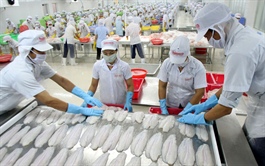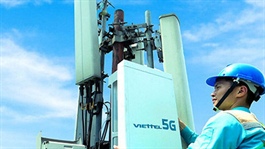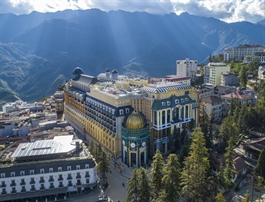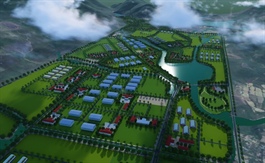Huge power demand, energy transition strategy makes VN attractive to foreign investment in low-emission energy
Huge power demand, energy transition strategy makes VN attractive to foreign investment in low-emission energy
Viet Nam aims to be an attractive destination for investment in low-emission energy, given the country’s huge power demand for development coupled with the national strategy of sustainable energy development with the priority on renewable energy.

Estimations by the Ministry of Industry and Trade showed Viet Nam would face a shortage of 6.6 billion kWh in 2021, 11.8 billion kWh in 2022 and 13 billion kWh in 2023. It would require a total investment of US$130 billion in new power projects by 2030 to make up for the shortages, equivalent to $12 billion annually.
The country’s power demand was forecast to increase by 8.5 per cent per year over the next five years and seven per cent between 2026 and 2030.
Early this year, the Politburo issued Resolution No 55-NQ-TW on the orientation of the National Energy Development Strategy by 2030, which paved the way for private investment in power sector and set a priority for renewable energy development.
Research showed Viet Nam had the potential to develop around 8,000MW hydroelectricity from small plants, 20,000MW of wind power and 3,000MW of biomass power and 35,000MW of solar power by 2030.
According to HSBC Viet Nam, which recently forecast an economic growth rate of 2.6 per cent this year and 8.1 per cent in 2021, during the past two decades, Viet Nam emerged as one of the countries with the fastest growing greenhouse gas emissions per capacity with an annual average growth of five per cent per year.
HSBC also noted that Viet Nam was one of the countries most vulnerable to climate change.
“It is an urgent need for Viet Nam to accelerate energy transition to low emissions,” HSBC stressed, adding that Government recognised the importance of the energy transition and was working to reduce the impact on the environment and effectively adapt to climate change.
According to Viet Nam Electricity, power demand was increasing rapidly, requiring the country to move towards clean energy resources to maintain the economic growth rate while protecting the environment and residents’ health.
In October, the US Agency for International Development (USAID) announced it would support Viet Nam to continue its transition to clean, secure and market-based energy sector by increasing the deployment of advanced energy systems, improving energy sector performance and increasing competition in the energy sector.
This would be implemented under the USAID Viet Nam Low Emission Energy Programme (V-LEEP 2) with a budget of more than US$36 million over five years.
USAID would contribute to the design, financing, construction and operation of new clean energy resources including 2,000MW of renewable energy and 1,000MW of combined-cycled, gas-fired power plants.
USAID Vietnam Mission Director Ann Marie Yastishock told Cong Thuong (Industry and Trade) online newspaper as saying that US enterprises were eyeing Viet Nam as an important destination for investment.
Delta Offshore Energy, Bechtel Corporation, General Electric and McDermott signed cooperation agreement to develop a LNG power project in Bac Lieu worth more than $3 billion.
Early this year, Bac Lieu Province handed over a decision on investment policy to Delta offshore Energy for the 3,200MW LNG power project which would have a total investment of $4 billion.
The Viet Nam Energy Summit 2020 in July saw signings of memorandums of understanding for several power projects, including a $10 billion offshore wind power project between Copenhagen Infrastructure Partners and Binh Thuan Province, and a gas-fired power complex in Van Phong Economic Zone in Khanh Hoa Province.
According to Nguyen Thuong Lang from the National Economics University, Ha Noi, Viet Nam must be selective in attracting foreign investment in the energy sector, meaning that the country must say no to outdated technology.
Nguyen Anh Tuan, Director of the Electricity Regulatory Authority of Viet Nam, said it was necessary to have an appropriate power pricing mechanism to attract foreign investment.
Senior economist of BIDV Can Van Luc said Viet Nam must speed up the construction of the power transmission infrastructure to ensure the synchronous connectivity for renewable energy projects.

























